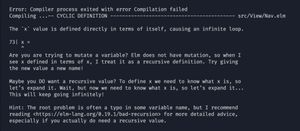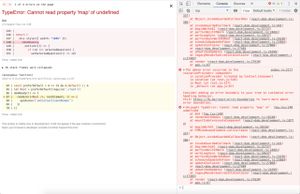I had been working in journalism and communications a couple of years before I discovered JavaScript. This language introduced me to programming and made me so excited that I decided to switch careers.
I left my communications job in 2018 and went all-in on web development, JavaScript and React.
JavaScript was easy to grasp as I could write code and right away see the result in the web browser.
Then I was forced into Elm
As I landed my first (and current) day job as a developer, I quickly got some code to work with. In Elm 😓 The rare mythical language I had heard of that inspired both React and Redux.
I had barely started getting to know types from TypeScript, but the type system and syntax in Elm felt alien to me.

I couldn't do mutations. I felt caged in a sterile clean-room. I had to send a message to some massive update function thing and send my requested change into a modified copy of the state model.
And if I did something wrong, or tried to force a this.setState({loading: false}) the app wouldn't even compile.
JavaScript didn't complain. And if it did complain, it did so silently, hidden away in the browser console. With webpack though, it screamed frantically with a cryptic stacktrace.
I felt puzzled and frustrated by the strictness.
But lucky for me, I had the attitude of wanting to learn why anyone would do it this way.
I first felt lost
I endured through it with the scarce selection of Elm resources. The good resources are really good, but the community is smaller than JavaScript and React. And 0.19 had just come with considerable breaking changes, so most tutorials then were useless to a beginner.
Most leading JavaScript influencers doesn't even mention Elm. At least not those who target beginners. They also barely scratch the surface on functional programming.
Still, I was starting to get increasingly productive after a week or two.
I eventually left the Elm project to work on a new project in my consultancy firm. Safely back in React. I could mutate again like there was no tomorrow.
Then I didn't want it any other way
My Elm mentor from the former project glanced at my screen while I was working in React, and he remarked, smugly:
- Did you really miss working like that?
I looked at my screen.

That error could never reach production in Elm because of the strong type system. But it could creep up on any React project. Even one written in TypeScript. And the error message above doesn't even point to the right line of code.
Initial pain bearing sweet fruits
I am convinced that the functional programming paradigm leads to reliable code that is easy to refactor. Every programmer wants that, but not every programmer seems to believe it's real. No wonder the the functional Javascript specification is called Fantasyland.
There is a threshold to learning it. Not taking the leap of faith certainly feels like a safer choice.
Functional programming differs from the procedural programming patterns. The learning curve can be a bit steep in the beginning. Even experienced programmers will need to invest time and energy in learning the patterns.
But every programmer wanting to grow should endure these initial pains. Because it's the pains of personal growth.
Just look at this pure mathematical function i made to prove it:
programmerGrowth : 🐱 -> Maybe (Awesome 🦁)
programmerGrowth kitten =
case kitten of
LearningFP ->
Just (Awesome 🦁)
NotLearningFP ->
Nothing
Even if you decide it's not for you, you will certainly become a better programmer for it. How could you not when broadening your horizon?
My learning path future
I have received some recommendations from colleagues that are far ahead of me in the FP game and I will pursue those.
I also realize that I will need to work with JavaScript and TypeScript a lot at work.
I am therefore currently reading about FP in JavaScript, with the highly recommended Professor Frisby's Mostly Adequate Guide to Functional Programming.
I am also planning to keep maintaining this site, written with elm-pages, the Elm equivalent of GatsbyJS.
More to about my functional journey to come.

